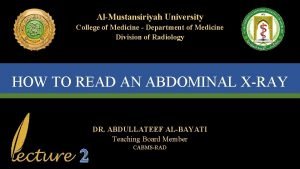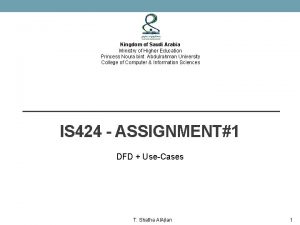Ministry of Higher Education Scientific Research Al Mustansiriya








- Slides: 8

Ministry of Higher Education & Scientific Research Al- Mustansiriya University College of Engineering First Year L e c t. E m a d A. H u s s i e n L e c t. G r e g o r A. A r m i s e A s s t. L e c t. M a j i d E. D o b a k h

LECTURE 6 1. Selection Statements: Conditional expressions are mainly used for decision making. C++ provides multiple selection structures: if, if/else, else if, nested if and switch. 2. The Single If Statement Structure: The IF statement is used to express conditional expression. If the given condition is true then it will execute the statements; otherwise it will execute the optional statements. General Form of single-selection If statement: if ( expression or condition ) statement 1 ; condition Example 1: if ( avrg >= 3. 5 ) cout << “good”; Example 2: if ( x > 0. 0 ) sum += x; Example 3: cin >> num; if ( num == 0 ) zcount = zcount + 1; statement 1

Example 1 Write a C++ program to read any two numbers and print the largest value of it: #include<iostream. h> void main( ) { Float x, y; Cout<<”Enter any two numbersn”; Cin>>x>>y; If (x>y) Cout << “largest value is”<<x<<endl; } 3. The Single Block If Statement Structure : The block IF statement are enclosed in ({) and (}) to group declaration and statements into a compound statement or a block. These blocks are always considered as a single statement. The structure is: General Form of single block selection If statement: if ( expression or condition ) { statement 1 ; statement 2 ; statement 3 ; } Example 2 Write a C++ program to read a number and check if it’s positive, if it’s so print it, add it to a total, and decrement it by 2: #include<iostream. h> void main( ) { int num, total=0; cin >> num; if ( num >= 0 ) { } } cout << num <<” is a positive”; total += num; num = num – 2;

General Form of If/else statement: if ( expression) statement 1 ; else statement 2 ; if ( expression) {statements } else {statements} 4. The If/else Statement Structure: The IF structure is Statement 1 true condition false Statement 2 In this case, either of the two statements are executed depending upon the value of the expression. Note that there is a semicolon after each of the statement but not after the IF expression. Note that the else statement without braces leads to confusion so: If (i>j) { If (a>b) temp=a; } Else temp=b; Example 1: cin >> value; if ( value >= 0 ) cout << “positive”; else cout << “negative”;

Example 2: cin >> num 1 >> num 2; if ( num 1 > num 2 ) cout << num 1; else cout << num 2; Example 3 Write a C++ program to read a student degree, and check if it’s degree greater than or equal to 50, then print pass, otherwise print fail: #include<iostream. h> void main( ) { int degree; cin >> degree; if (degree >= 50 ) cout << ”pass”; else cout << “fail”; } Example 4 Write a C++ program to read a number, and check if it’s even or odd: #include<iostream. h> void main( ) { int num; cin >> num; if ( num % 2 == 0 ) cout << ”even”; else cout << “odd”; }

5. Else if Statements: General Form of else if statement: if ( expression or condition 1 ) statement 1 ; else if ( expression or condition 2 ) statement 2 ; else if ( expression or condition 3 ) statement 3 ; : else if ( expression or condition n ) statement-n ; else statement-e ; Example 1: if ( value == 0 ) cout << “grade is A”; else if ( value == 1 ) cout << “grade is B”; else if ( value == 2 ) cout << “grade is C”; else cout << “grade is X”; Example 5 Write a C++ program to read a number, and print the day of the week: #include<iostream. h> void main( ) { int day; cin >> day; if ( day == 1 ) cout << “Sunday”; else if (day == 2 ) cout << “Monday”; else if (day == 3 ) cout << “Tuesday”; else if (day == 4 ) cout << “Wednesday”; else if (day == 5 ) cout << “Thursday”; else if (day == 6 ) cout << “Friday”; else if (day == 7 ) cout << “Saturday”; else cout << “Invalid day number”; }

Example 6 Write C++ program to compute the value of Z according to the following equations: { Z= x+5 : x<0 cos(x) + 4 : x = 0 √x : x>0 #include<iostream. h> void main( ) { int Z, x; cout << "Enter X value n"; cin >> x; if ( x < 0 ) Z= x + 5; else if ( x == 0 ) Z= cos(x) + 4; else Z= sqrt(x); cout << "Z is " << Z; } 6. Nested If Statements: Some of the samples of NESTED if-else constructions are shown below: If (exp. ) { Statements } Else { Statements} If (exp. ) {Statements} Else { } Statements} Else {Statements} If (exp. ) {Statements} Else { Statements} } Else {If (exp) {Statements} Else {Statement} }

Example 7 Write C++ program to find a largest value among three numbers: #include<iostream. h> void main( ) { Float x, y, z; Cout<<”Enter any two numbersn”; Cin>>x>>y, z; If (x>y) { If (x>z) Cout << “largest value is”<<x<<endl; Else Cout << “largest value is”<<z<<endl; } Else If (y>z) Cout << “largest value is”<<y<<endl; Else Cout << “largest value is”<<z<<endl; }
 Al mustansiriya university college of medicine
Al mustansiriya university college of medicine Ministry of higher education afghanistan
Ministry of higher education afghanistan Ministry of education kurdistan
Ministry of education kurdistan Krg ministry of higher education
Krg ministry of higher education Kurdistan higher education
Kurdistan higher education Ministry of higher education saudi arabia
Ministry of higher education saudi arabia Ministry of higher education kurdistan
Ministry of higher education kurdistan Ministry of higher education tunisia
Ministry of higher education tunisia Ministry of higher education saudi arabia
Ministry of higher education saudi arabia















